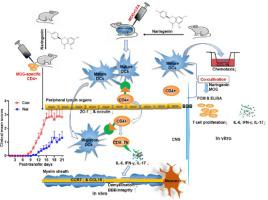The Journal of Nutritional Biochemistry ( IF 4.8 ) Pub Date : 2020-11-26 , DOI: 10.1016/j.jnutbio.2020.108560 Xinli Niu 1 , Hongzhen Sang 2 , Junpeng Wang 3

|
Targeting pathogenic immune cell trafficking poses an attractive opportunity to attenuate autoimmune disorders such as multiple sclerosis (MS). MS and its animal model, experimental autoimmune encephalomyelitis (EAE), are characterized by the immune cells-mediated demyelination and neurodegeneration of the central nervous system (CNS). Our previous study has proven that dietary naringenin ameliorates EAE clinical symptoms via reducing the CNS cell infiltration. The present study examined the beneficial effects of naringenin on maintaining the blood-brain barrier in EAE mice via dietary naringenin intervention. The results showed that naringenin-treated EAE mice had an intact blood-CNS barrier by increasing tight junction-associated factors and decreasing Evans Blue dye in the CNS. Naringenin decreased the accumulation and maturation of conventional dendritic cells (cDCs), CCL19, and CCR7 in the CNS. Also, naringenin blocked the chemotaxis and antigen-presenting function of cDCs that resulted in reducing T-cell secreting cytokines (IFN-γ, IL-17, and IL-6) in the spleen. Importantly, naringenin blocked pathogenic T cells infiltrated into the CNS and attenuates passive EAE. Therefore, by blocking chemokine-mediated migration of DCs and pathogenic T cells into the CNS, naringenin attenuates EAE pathogenesis and might be a potential candidate for the treatment of autoimmune diseases, such as MS and other chronic T-cell mediated autoimmune diseases.
中文翻译:

柚皮素通过保护血脑屏障的完整性和控制炎症细胞迁移减轻实验性自身免疫性脑脊髓炎
靶向致病性免疫细胞贩运为减轻多发性硬化症 (MS) 等自身免疫性疾病提供了一个有吸引力的机会。MS 及其动物模型实验性自身免疫性脑脊髓炎 (EAE) 的特征是免疫细胞介导的中枢神经系统 (CNS) 脱髓鞘和神经变性。我们之前的研究已经证明,膳食柚皮素通过减少 CNS 细胞浸润来改善 EAE 临床症状。本研究通过饮食柚皮素干预检查了柚皮素对维持 EAE 小鼠血脑屏障的有益作用。结果表明,柚皮素处理的 EAE 小鼠通过增加紧密连接相关因子和减少中枢神经系统中的伊文思蓝染料而具有完整的血液中枢神经系统屏障。柚皮素降低了中枢神经系统中常规树突细胞 (cDC)、CCL19 和 CCR7 的积累和成熟。此外,柚皮素阻断 cDC 的趋化性和抗原呈递功能,导致脾中 T 细胞分泌细胞因子(IFN-γ、IL-17 和 IL-6)减少。重要的是,柚皮素阻断了渗入中枢神经系统的病原性 T 细胞并减弱了被动 EAE。因此,通过阻断趋化因子介导的 DC 和致病性 T 细胞向 CNS 迁移,柚皮素减轻 EAE 发病机制,并可能成为治疗自身免疫性疾病(如 MS 和其他慢性 T 细胞介导的自身免疫性疾病)的潜在候选药物。柚皮素阻断 cDC 的趋化性和抗原呈递功能,导致脾中 T 细胞分泌细胞因子(IFN-γ、IL-17 和 IL-6)减少。重要的是,柚皮素阻断了渗入中枢神经系统的病原性 T 细胞并减弱了被动 EAE。因此,通过阻断趋化因子介导的 DC 和致病性 T 细胞向 CNS 迁移,柚皮素减轻 EAE 发病机制,并可能成为治疗自身免疫性疾病(如 MS 和其他慢性 T 细胞介导的自身免疫性疾病)的潜在候选药物。柚皮素阻断 cDC 的趋化性和抗原呈递功能,导致脾中 T 细胞分泌细胞因子(IFN-γ、IL-17 和 IL-6)减少。重要的是,柚皮素阻断了渗入中枢神经系统的病原性 T 细胞并减弱了被动 EAE。因此,通过阻断趋化因子介导的 DC 和致病性 T 细胞向 CNS 迁移,柚皮素减轻 EAE 发病机制,并可能成为治疗自身免疫性疾病(如 MS 和其他慢性 T 细胞介导的自身免疫性疾病)的潜在候选药物。











































 京公网安备 11010802027423号
京公网安备 11010802027423号